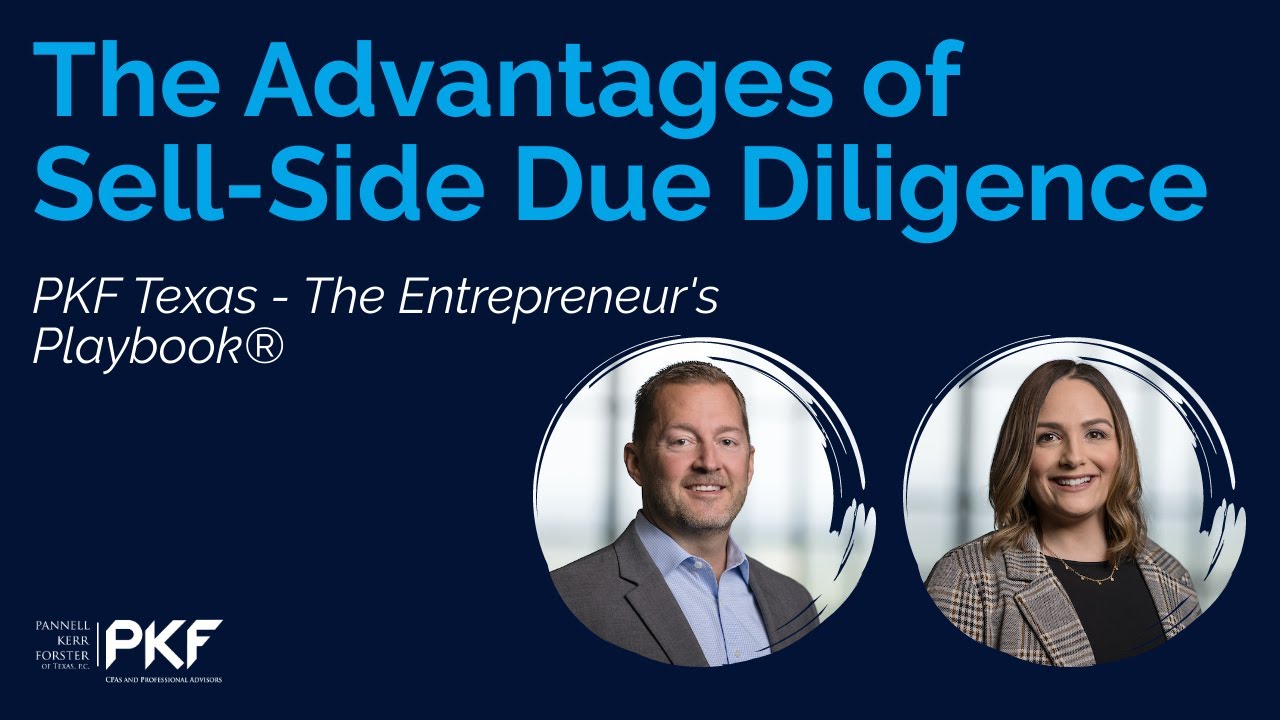The Advantages of Sell-Side Due Diligence

Jen: This is the PKF Texas – Entrepreneur’s Playbook®. I’m Jen Lemanski, and I’m here with Chris Hatten and Kimberly Wood, both members of our transaction advisory services team. Y’all, welcome to the Playbook.
Chris: We appreciate it.
Kimberly: Yeah. Thanks for having us.
Jen: So, Chris, Kimberly, what advantages are there to sell-side due diligence for a company?
Chris: Well, we don’t have as much time as we need to go into all of it, but from a high level, I say that two advantages are there’s the advantage to the seller, as well as to the company.
Jen: And so, Kimberly, what would the advantage to the company be?
Kimberly: Well, the advantage for the company would be to get your operations in order, get your financial statements in order, get your processes in place, have all your current documents, organization tax returns up to date and be ready to facilitate that process.
Jen: And then Chris, what about the other side?
Chris: Well, from the seller’s perspective, this is pretty much a large paradigm shift for them, because you might have some of these owner-operators that this is their baby that they’ve been building up for 20 or 30 years, or it might have been something that they’ve taken over from a previous generation. And so, just kind of going through that sell-side process starts warming them up to that, really the eventual exit from the business.
And so, that’s a large shift for a lot of people going towards retirement or something. And so, it gives them a chance to talk about their business in ways that they probably haven’t before. The conversations that they’re going to have with a buyer or potential buyer are totally different than what it is when they go in and talk with the bank about getting a line of credit or term debt. And so, it just kind of helps facilitate that process as far as conversation because the buyer isn’t going to be pointing out all the great things that the business is doing. They’re going to be looking at ways to kind of.
Jen: Get that purchase price.
Chris: Get that number down a little bit, maybe nitpick in areas. And so, it gives them a chance to prepare for those questions as well.
Jen: When should they bring in a firm like ours to assist with that type of thing?
Kimberly: I’d say a good two or three years before, just to start looking at things, start pointing out those potential add backs adjustments so that there are no surprises when that comes time to sell.
Chris: Yeah, because right now a lot of the transactions that we’ve started early in the year are still—they’re still going through that sales side process. You know, they’ve got the investment bankers involved, and we’ll get our numbers updated through a certain point. They continue that conversation whether it’s the seller or the target, and then they have us come in and then we continue to update our numbers sometimes all the way up until closing. And so, here we are nine months later still working on some of these transactions that we started early in the year.
Jen: Wow. That sounds great. Well, I’ll get you guys to come back and talk a little bit more about due diligence and some other topics for transaction advisory services. Sound good?
Chris: Sounds great.
Kimberly: Sounds good.
Jen: This has been another thought leadership production brought to you by PKF Texas – The Entrepreneur’s Playbook®. For more information about transaction advisory services, visit www.pkftexas.com. Tune in next week for another chapter.

